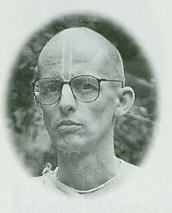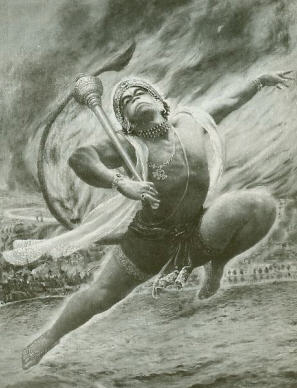
Satsvarupa Dasa Goswami
SRILA PRABHUPADA told us that a devotee doesn't make plans. As a matter of fact, he said that not making plans is the first symptom of a person fixed in Krsna consciousness. How can he live without making plans? He depends on Krsna.
Often when people hear that, they think it's utopian. That's because the ability to depend solely on Krsna belongs to a devotee who is very advanced. An advanced devotee may not even make arrangements for financial security. His only plan is to depend on Krsna.
There are many stories in the scriptures that point to success in depending on Krsna. Narada Muni once came across a hunter named Mrgari. When Mrgari surrendered to Narada, Narada instructed him to break his bow. But his bow was his livelihood. If he broke his bow, how would he feed his family? Narada assured him that by not making any plans and just depending on Krsna, he would receive everything he needed.
It turned out that Mrgari became famous as a hunter-turned-Vaisnava. Many people came to see for themselves the converted hunter and brought offerings of rice and other foods. Mrgari had such an abundance of food that he was able to offer charity to others.
Devotees should strive for this kind of dependence on Krsna. Krsna will take care of us. As Krsna says in the Bhagavad-gita, we have to give up desires that arise from mental concoction and the bodily concept of life. If we agree that we are Krsna's servants, then we should have faith that He will take care of us.

Srila Prabhupada said that his own spiritual master thought like that. Although Srila Bhaktisiddhanta Sarasvati Thakura was a preacher and the head of a big religious movement, he would never speak definitely about his plans. When asked the details of a program he was to hold, Bhaktisiddhanta Sarasvati would say, "Yes, the lecture will be in the town hall, if Krsna desires."
We are sometimes so caught up in our passionate activities that this kind of statement frustrates us. Does a devotee make such a statement out of laziness or foolishness? A devotee is always active and alert, and certainly a devotee working under the order of his spiritual master is not foolish. Rather, it is because a devotee is intelligent that he makes no plans of his own.
Prabhupada said a devotee works under Krsna the same way an apprentice works under a craftsman: he does only what his superior tells him. Even when a devotee matures, he always consults guru and Krsna his higher authorities and does not act independently. That is a sign not of laziness or overdependence but of intelligence.
Here is another story, this time from the Ramayana. Lord Krsna in His incarnation as Lord Rama sent Hanuman to Lanka to find Sita. After searching the whole city, he finally found Sita alone in an asoka garden, met her, and secured from her a token of her love for Rama. Hanuman's mission was fulfilled, but instead of returning at once to Rama, Hanuman decided to do more for his Lord. Therefore he announced his presence in the city and single-handedly defied the demons and set Lanka on fire. Was he surpassing Rama's instructions? No, when Lord Rama saw Hanuman again, Lord Rama embraced him and called him the best servant. A first-class servant uses his intelligence to serve the heart of his Lord's instructions, and while doing so depends on Krsna for the results.
Being prepared to follow Krsna's plan is the platform of steadiness. When a devotee is on that platform, the mind's usual policy of accepting and rejecting situations based on the comforts of the body no longer affects his determination to serve.
All material plans arise from physical or mental considerations. Although we devise a plan to make things better, the new plan just brings a different way for things to be bad.
A devotee's only real plan is to surrender to Krsna and thus become free of all material misery. The fool, however, prefers a headache to the pain he feels in his back but has no thought of becoming free of all pain. Srila Prabhupada told a story to illustrate this point. In India, there is a type of boatman who pulls boats up a river by walking the shore with a rope and lugging the boats along. One of these boatmen was imagining he was becoming rich. "When I become rich, I will cover the banks of this river with pillows. Then I will no longer hurt my feet on the pebbles and thorns as I pull the boats." He was so foolish that he didn't even realize that his wealth would free him from having to pull the boats at all.
In the Bhagavad-gita, Krsna says that the symptom of a man fixed in transcendence is that he gives up all varieties of desires. He doesn't become desireless, but all his desires become spiritual. Prabhupada describes this as "dovetailing the individual consciousness with the Superconsciousness." This is the natural relationship of the subordinate living entity with the Supreme.
A devotee surrenders his material desires not because Krsna is more powerful than he is but because of love. He depends on Krsna because he loves Krsna, he trusts Krsna, and he knows that Krsna wants his surrender. Krsna will accept our offerings if they are offered with devotion, like the item a child offers his father from the child's plate at the dinner table. The child's offering is insignificant the father has already provided the entire meal but the father is touched by the child's affectionate gesture. This is the mood a devotee wants to have with Krsna unselfish, loving, and interested only in Krsna's pleasure. All other desires are simply plans to increase our suffering.
Our material desires form the blueprint for our next bodies, and if those desires are not even the authorized plans for human behavior, then we will have to take a lower birth. The fixed devotee, therefore, sees all material desires and their results as phantasmagoria. He knows he can find satisfaction in the self alone. What is satisfying to the self? Only service to Krsna.
In a memo, Prabhupada said to one devotee: "Your material formulas will not help you. Krsna consciousness means to become mad after Krsna and to follow the order of the spiritual master. Why have you missed this important point?" Therefore, surrender is the only plan a devotee makes.
Satsvarupa Dasa Goswami travels extensively to speak and write about Krsna consciousness. He is the author of more than two dozen books, including a six-volume biography of Srila Prabhupada.
